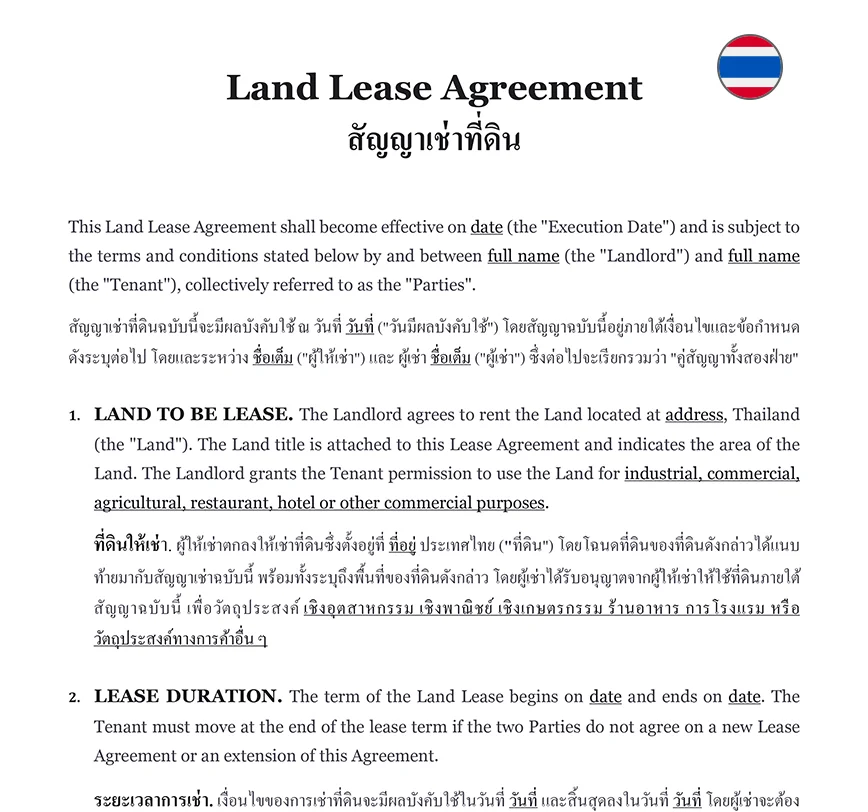Ready to use legal template
Drafted by experienced lawyers
Certified Thai-English translation
Ready to use legal template
Drafted by lawyers
Translated in Thai-English
Home › Rent your property › Land lease agreement
Learn more about Land Lease Agreement
A Land Lease Agreement is a legal contract that allows one party (the lessee) to use land owned by another party (the lessor) for a specified period and purpose, usually in exchange for rent. In Thailand, this agreement is commonly used for residential, commercial, agricultural, or industrial purposes, and must comply with the Thai Civil and Commercial Code. A properly drafted Land Lease Agreement protects the rights of both parties, outlines clear terms for use, rent, duration, renewal, and termination, and helps avoid future disputes. It is especially important for foreign investors or businesses leasing land. Download our Land Lease Agreement available in an easy to edit Word format and drafted by expert in English and Thai.
Table of contents
What types of land can be leased?
What is the legal protection of this land lease agreement?
Who must pay for the maintenance of the land?
What if there are buildings on the land?
Can a foreigner obtain a land lease in Thailand?
Do I have to register the land lease with the Land Department?
Can you lease your land for a short period of time?
What are the advantages of a land lease?
Can a land lease be renewed in Thailand?
What are the risks of renting land without a contract?
What types of land can be leased?
A land lease can be on bare land or on arable farmland. It is also possible to enter into a lease on a garden. In the latter case, it can be either a garden that is an outbuilding of the main building or a garden that is rented independently and like the main building.
What is the legal protection of this land lease agreement?
Our land lease agreement includes the following terms:
Party Information: Who are the parties to the land lease?
Payment of Rent: What is the amount of rent paid by the tenant?
Area of the land lease: How much land is being leased?
Term of the lease: When will the lease end (i.e. after a fixed number of years or if a condition or event occurs)?
Tenant’s expenses: Can the landlord keep the improvements or reimburse the tenant for them?
Use: Choose whether the land can be used for commercial or residential purposes.
Access: Confirm whether the landlord retains the right to enter the land at certain times and for specific purposes and specify the gates or roads the tenant may use.
Amendment: Indicate whether future amendments to the land lease agreement must be in writing.
Liability: Indicate whether the tenant is required to carry liability insurance for the property and whether the landlord will be released from liability for any injury or damage that may occur to the property during the tenant’s lease.
Subletting: Indicate whether or not the tenant may sublet the property.
Utilities: Indicate whether the landlord or tenant is responsible for the provision of electricity, water, sewer, roads or any other services required for the use of the property.
Security Deposit: The landlord may require an additional amount of money as security for any damage caused to the tenant’s property during occupancy.
Termination: Specifies how and if the landlord and/or tenant may terminate the land lease agreement, usually for non-payment of rent or failure to maintain the property.
Who must pay for the maintenance of the land?
According to Thai law, the tenant must take care of the routine maintenance of the land, its annexes and its exterior. At the time of his departure, he must also give you back an accommodation in conformity with the one he had received at his arrival. Therefore, the Tenant has the obligation to maintain the garden which he/she has the exclusive use of.
However, you and your Tenant can decide how to cover these expenses. During the term of the land lease agreement, the Landlord will continue to own the land, but the Tenant will have the use of it.
Here are some possible solutions:
| ➤ The Landlord pays all maintenance expenses |
| ➤ Landlord pays for parts, but Tenant pays for labor |
| ➤ The Tenant pays up to an agreed-upon amount, and the Landlord pays the rest for major repairs |




